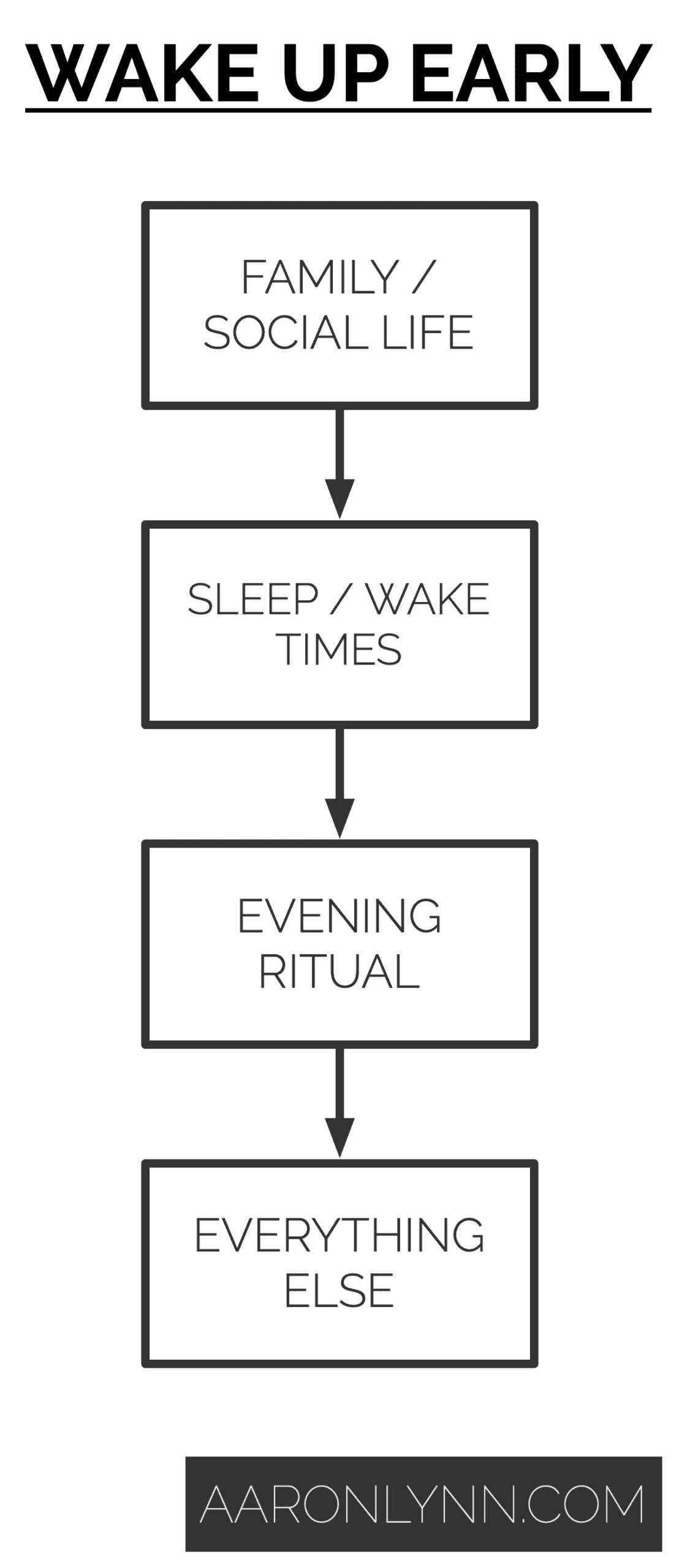
Waking up early is not supposed to be difficult.
There are four factors that really matter if you want to wake up early on a consistent basis, and some of those factors are more important than others.
If you’ve been through all the guides on how to sleep well and get better quality sleep but still haven’t been able to wake up early — I’m going to show you specifically how to wake up early on a consistent basis.
Benefits of Waking Up Early
Either you do or you don’t want to wake up early.1I would consider anything before 6am as “early”.
Both options are fine, depending on your lifestyle and your goals.
Most people strive to wake up early because of what it implies — you don’t wake up at 5am to watch Netflix. You wake up early to get your life together and to get things done.
The Wake Up Early System
There are four factors that really matter when it comes to waking up early consistently. In order of importance they are:
- Your family and social life.
- Your sleep and wake times.
- Your evening ritual and personal care.
- The compounding effect of everything else.
1. Your family and social life
More than anything else, your ability to wake up early on a consistent basis will be determined by your family and social life.
For your family life, if you have young children who wake up in the middle of night or who don’t sleep early, it doesn’t matter how optimised your evening ritual or sleep hygiene is — you will not be able to wake up early on a consistent basis.2I am not a parent so take this with a grain of salt.
If you live with a partner who:
- Sleeps and/or wakes up at a different time from you.
- Likes to sit in bed and browse their phone while you’re trying to get to sleep
- Has a loud alarm that goes off before or after your waking hours.
- Tosses and turns and you’re a light sleeper.
…no other techniques or principles matter — you will not be able to wake up early on a consistent basis.
To make waking up early work for you, you need to negotiate things with your partner.
If they are committed to sleeping and waking up early at the same time as you — that’s great.
If they can use the vibrating alarm on their smartwatch — that’s also great.
If not, the only thing you can really do is sleep in different bedrooms 😶.
For your social life, waking up early means turning down the majority of late dinners or nights out. You may get away with a couple of times a month, but there’s no real way around this.
2. Sleep and wake times
The second most important factor for waking up early is the time you go to sleep.
People are usually impressed when I tell them that I wake up at 4:30am, even on weekends.
But for some reason they are surprised to learn that I’m fast asleep by 9pm.
For some reason there is a disconnect between waking up early and going to sleep early.
The way to do this is simply to decide what time you would like to consistently wake up, and count back your 7-8 hours.
Can you get away with not always sleeping early?
Only a little.
This means that sleeping late one night a week is OK, but you’ll do better if that’s only one night a month.
And when I say “sleep early”, I really do mean lights-out-and-under-the-covers. I don’t mean “get into bed and play on your phone”.
If you don’t do this, you will end up tired a lot of mornings and likely conclude that waking up early is not for you.
3. Evening ritual and personal care
The third most important factor for waking up early is your evening ritual.
This is your wind down process towards sleep at least one hour before your sleep time.
Your evening ritual is important because it helps you get to bed on time.
I’ve written a full guide to evening rituals which can be found here, but the highlights are:
- No electronic devices one hour before bedtime.
- Do activities that relax you, not excite you. Don’t watch exciting TV/web series or read things that make you think and analyse.3I’ll also add: Don’t try to solve complex business problems right before bedtime.
- Do things that signal that it’s time to go to sleep, like dimming the lights or drinking some chamomile tea.
4. Everything else
There are a number of other factors that play into your ability to wake up early.
They are not as important as the three main factors mentioned above.
In no particular order, here they are.
Exercise
When you regularly exercise you have more consistent energy levels.
It’s also been shown that exercise helps you sleep better, AND helps your body wake up consistently on time.4Dolezal, B. A., Neufeld, E. V., Boland, D. M., Martin, J. L., & Cooper, C. B. (2017). Interrelationship between Sleep and Exercise: A Systematic Review. Advances in Preventive Medicine, 2017, 1364387. https://doi.org/10.1155/2017/1364387
Food timing
There is a lot of debate about whether eating a large meal before bedtime is good for you or bad for you.
My personal joke about this is that lions on the savannah hunt their prey, eat it, then lie down and slumber beside it… so I should be able to do the same 🦁🥩.

The actual research though says that eating right before sleeping reduces the quality of your sleep.5St-Onge, M. P., Mikic, A., & Pietrolungo, C. E. (2016). Effects of Diet on Sleep Quality. Advances in Nutrition (Bethesda, Md.), 7(5), 938–949. https://doi.org/10.3945/an.116.0123366Crispim, C. A., Zimberg, I. Z., dos Reis, B. G., Diniz, R. M., Tufik, S., & de Mello, M. T. (2011). Relationship between food intake and sleep pattern in healthy individuals. Journal of Clinical Sleep Medicine, 7(6), 659–664. https://doi.org/10.5664/jcsm.1476
This doesn’t mean that you can’t sleep, just that your sleep quality will be lower than it would be if you slept 2-3 hours after eating.
It also doesn’t mean that you can’t wake up early on a consistent basis, as the three main factors are more important.
My take?
Eat your food, run your evening ritual, then go to sleep.
Doing things in this order means you won’t waste time doing the usual late-night things like browsing your phone or watching TV/web series.
Sleep supplements
Supplements work differently for everyone regardless of if they are pharmaceutical or nutraceutical in nature.
Do your own research, and take what is designed to signal your body that it’s time to sleep.
Some options:
- Melatonin.
- ZMA.
- Chamomile tea.
Keep in mind that with any supplements, your body may build a tolerance over time.
Your work
What you do during the day affects your ability to get to sleep, and thus your ability to wake up early.
There are two parts to this.
The first part is to work hard during the day so that you’re tired both physically and mentally and actually want to sleep.
If you’ve knocked out your goals and tasks for the day and feel like you’ve done a lot you’re more likely to “call it a day” and go to sleep early with a sense of accomplishment. This then leads to waking up early.
The second part is the timing of your work.
You don’t want to be working right before you have to go to sleep for a couple of reasons:
- It’s the end of the day so you’ll have a lower cognitive ability.
- Having pressing work issues on your mind makes it harder to wind down.
Waking up early is already set up so that you can be productive in the morning — so take advantage of that, and go hard earlier on during the day,7This is also known as front-loading. so that by the time you bedtime rolls around, you will want to go to sleep.
How This Looks in Real Life
Here’s how this can look in real life.
You wake up at 4:30am, do your morning routine and get on with your work or activities for the day.
You work hard and consistently throughout the day with a break at lunchtime to do some exercise.
You eat dinner around 6:30pm, and wind down from 7:30pm onwards.
By 8:30pm you’re in bed and the lights are out, giving you eight hours of sleep until 4:30am again.
When you have late night social commitments, you try to limit them to once per week.
And even then, you find that because you’re used to waking up so early… even after those nights out you’re up-and-at-it by 6am anyway.
What To Do Next
I believe that anyone can consistently wake up early… so long as they follow the four factors outlined above.
Here they are again:

Once you’re up early, you may want to run a morning ritual to make the most of your starts to the day. You can learn about them here.
Go forth, and wake up early ☀️.
- I would consider anything before 6am as “early”.
- I am not a parent so take this with a grain of salt.
- I’ll also add: Don’t try to solve complex business problems right before bedtime.
- Dolezal, B. A., Neufeld, E. V., Boland, D. M., Martin, J. L., & Cooper, C. B. (2017). Interrelationship between Sleep and Exercise: A Systematic Review. Advances in Preventive Medicine, 2017, 1364387. https://doi.org/10.1155/2017/1364387
- St-Onge, M. P., Mikic, A., & Pietrolungo, C. E. (2016). Effects of Diet on Sleep Quality. Advances in Nutrition (Bethesda, Md.), 7(5), 938–949. https://doi.org/10.3945/an.116.012336
- Crispim, C. A., Zimberg, I. Z., dos Reis, B. G., Diniz, R. M., Tufik, S., & de Mello, M. T. (2011). Relationship between food intake and sleep pattern in healthy individuals. Journal of Clinical Sleep Medicine, 7(6), 659–664. https://doi.org/10.5664/jcsm.1476
- This is also known as front-loading.
Photos by Alex King, Dušan Smetana.